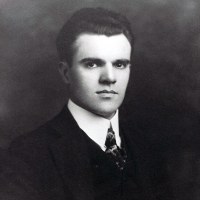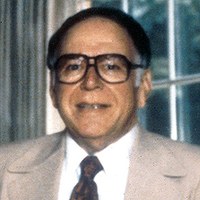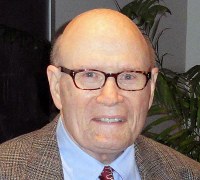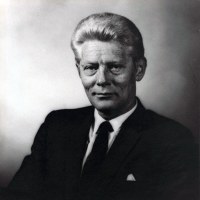Endowed Lectures

In addition to the traditional Chairman's Derby Lecture presented the week of the world-famous Kentucky Derby, the University of Louisville Department of Medicine hosts six other "named" lectures.
Those lectures include:

He became a Research Fellow at the University of Louisville in the Department of Physiology working his way through the academic ranks to Professor of Medicine with Tenure by 1974.
Dr. Carrasquer was well known internationally for his groundbreaking research on the physiology of electrogenic cellular pumps.
He was one of the most remembered and highly regarded teachers in the UofL medical school, and former students from his decades of teaching continued to seek his counsel and insight long after they left UofL.
The Carrasquer Lecture was established in 2018 by family, friends and fellow faculty at UofL and the Louisville community. His longtime friend and colleague Dr. Jon Klein had the honor of delivering the series' inaugural talk in October 2018.
 John Walker Moore, M.D., was born in McConnellsville, South Carolina, and earned a BS degree at North Carolina’s Davidson College in 1906. He began medical school at the University of North Carolina at Chapel Hill and earned his MD from the University of Pennsylvania in 1912.
John Walker Moore, M.D., was born in McConnellsville, South Carolina, and earned a BS degree at North Carolina’s Davidson College in 1906. He began medical school at the University of North Carolina at Chapel Hill and earned his MD from the University of Pennsylvania in 1912.
After an internship at Episcopal Hospital in Philadelphia, he came to the University of Louisville as an instructor of pathology and bacteriology in 1915.
In 1917, he joined the U.S. Army as a captain and served overseas for 18 months with the American Expeditionary Force as Officer in Charge of Laboratories at the hospital center in Nantes, France.
Dr. Moore returned to Louisville in 1923 and was named chairman of the University of Louisville Department of Medicine as well as Staff Executive of Louisville General Hospital.
When Dean Stuart Graves resigned his post in 1928, Dr. Moore served in the interim administrative committee until his eventual appointment as dean at the end of that year and continued in those posts until 1949.
During his administration, the School of Medicine survived the Great Depression and the 1937 flood. It also added an annex at First and Chestnut streets, offered accelerated training during World War II, and in 1948 became the first unit of the University to receive regular state appropriations.
Dr. Moore retired as dean in 1949 and was the Alben W. Barkley Professor of Medicine until his death in 1952.
He is known for his work in cardiography, basal metabolism, blood chemistry as well as a dye-dilution method for determining cardiac output which he developed with J. Murray Kinsman.
 Richard N. Redinger obtained his MD from the University of Western Ontario and served medical residencies at Canada's old Victoria Hospital in London, the University of Michigan and Tufts University.
Richard N. Redinger obtained his MD from the University of Western Ontario and served medical residencies at Canada's old Victoria Hospital in London, the University of Michigan and Tufts University.
While in Boston, he secured an Ontario Department of Health Traveling Scholarship for three additional years as a research fellow at Boston University which produced seminal papers defining the physiology of biliary lipids in primates.
He continued research on the pathophysiology of gallstone disease upon his return to the University of Western Ontario for seven years and developed the only Biliary Research Laboratory in Canada at that time.
After returning to Boston University as Associate Professor of Medicine at the Evans Memorial and Chief of Gastrointestinal Research, he came to the University of Louisville in 1981 as Professor of Medicine and the first academic chief of the Division of Gastroenterology and Hepatology.
He became the Executive Vice Chair in the Department of Medicine and was asked to continue his chiefship while serving as acting chairman and Training Program Director for the department for three years. He was named permanent Chairman of the department in 1992.
Under his leadership the department grew from 43 to 146 faculty members.
He served as service chief of medicine at University of Louisville Hospital, an officer and founding member of multiple School of Medicine Boards including University Physicians Associates, University Health Care and was President of the Medical School Fund.
He was a Fellow of the Royal College of Physicians and Surgeons of Canada in Internal Medicine and Gastroenterology and of the American College of Physicians, and a member of the Canadian Society for Clinical Investigation, the American Federation for Medical Research and the Central Society for Clinical Research and American Association for the Study of Liver Disease.
He served as Program selector and abstract reviewer of the American Federation for Clinical Research Southern Section, American Association for the Society of Liver Disease (Bile Salts & Gallstone Section) and Secretary/Treasurer and President of the Kentucky Society for Gastrointestinal Endoscopy.
He received the Laureate and Chapter Awards from the Kentucky Affiliate of American College of Physicians.
Established in 2018 through a generous gift from Dr. Redinger and his wife Arlene Redinger, the Arlene and Richard Redinger Lecture Series annually brings world renowned experts in the field of gastroenterology to speak at The University of Louisville.
 The Theodore Segal Lecture fund was established December 7, 1982, in memory of an outstanding member of the academic community and a humanitarian.
The Theodore Segal Lecture fund was established December 7, 1982, in memory of an outstanding member of the academic community and a humanitarian.
Dr. Segal received his dental degree from the University of Louisville in 1954 and his orthodontic training at Tufts University in 1956.
He joined the staff of the University of Louisville Dental School in 1969 on a part-time basis, where he was one of the two founders of the new Department of Orthodontics. He maintained his faculty association until his death.
A veteran of World War II, Dr. Segal was a member of many dental and orthodontic associations and held offices in the Louisville and Kentucky Orthodontic Associations. He was also a member of the Kentucky Health Systems Agency and an active member of Alpha Omega professional fraternity.
Dr. Segal contributed to the education of many generations of orthodontists. Ted, as his colleagues and students knew him, always gave unselfishly of this time and talents.
His friendly disposition and willingness to help were almost proverbial, even though never imposed on anybody.
He died in 1982 of cancer and his family bequeathed this lectureship in Medical Oncology in his honor.
 The Charles C. Smith Jr. Annual Lectureship in Medicine was established in 1987 in honor of Dr. Smith and as a memorial to his dear friend and patient, Armor Hugh Platt Taylor.
The Charles C. Smith Jr. Annual Lectureship in Medicine was established in 1987 in honor of Dr. Smith and as a memorial to his dear friend and patient, Armor Hugh Platt Taylor.
Mr. Taylor was fascinated by Dr. Smith’s bedside teaching of tutorial students. Mr. Taylor’s wife, Dr. Letitia S. Kimsey, a former medical microbiology teacher, endowed this lectureship.
Charles C. Smith Jr., M.D., FACP, grew up in the Appalachian community of Fonde, Ky. He attended Georgetown College and graduated summa cum laude.
In 1955, he received his medical degree from the University of Louisville where he was elected to Alpha Omega Alpha Honor Medical Society.
He completed a rotating internship at University Hospital and Hillman Clinic in Birmingham, Ala., then served as a U.S. Air Force flight surgeon for three years before completing his Internal Medicine residency at the University of Louisville Hospitals. He served as Chief Resident from 1960-61.
Dr. Smith was known as a consummate diagnostician, spending four decades taking exceptional care of his patients. Since 1961, he has served as clinical faculty at the University of Louisville, rising from Instructor to Clinical Professor of Medicine in 1985.
He welcomed medical students into his practice and always emphasized the importance of getting patients' medical histories. "The history is everything," he asserts. "A patient will usually tell you everything you need to make the diagnosis."
Dr. Smith was named one of the nation's "Best Doctors" in 1980. He was known as the "doctor to the doctors" for many years before retiring from private practice in 2001.
He was involved with many organizations, including serving terms as president for the Innominate Society for the Study of Medical History, the Louisville Society of Internists, the Jefferson County Medical Society, and the Kentucky Medical Society (KMA), as well as Governor of the American College of Physicians.
Beginning in 2006, he served as Editor of Vital Signs, the Greater Louisville Medical Society’s patient education quarterly publication.
Dr. Smith received the Outstanding Alumnus Award from Georgetown College in 1973, Alumni Service Award from U of L in 1987, Physician Laureate Award (Kentucky Chapter) from the American College of Physicians in 1991, Distinguished Alumnus Award from U of L School of Medicine in 1993, Excellence in Primary Care Award at the Caritas Foundation Doctors' Ball in 2004, Distinguished Service Award from the Kentucky Medical Association in 2008, and was named 2009 Ephraim McDowell Physician of the Year.
Dr. Smith served the community by making laundry runs for Hospital Hospitality House, serving as a key contact on KMA's National Legislative Activities Committee, serving on the Board of the Family Health Centers, developing a St. Catharine College health sciences satellite training center at the restored U.S. Marine Hospital to create "better health and better jobs in the Portland community" and supporting Red Bird Mission's health and wellness outreach in eastern Kentucky.
Dr. Smith passed in 2019 and is survived by his wife, Rosemary, and together raised four children.
 Beverly Todd Towery, M.D., was born in 1915 and thus was just the right age to be a part of the dramatic advances in medicine during and after World War II.
Beverly Todd Towery, M.D., was born in 1915 and thus was just the right age to be a part of the dramatic advances in medicine during and after World War II.
He loved the clinical aspect of his profession and he gloried in teaching.
He was at his best when doing either one, whether it was as an Army doctor during the invasion of Italy or on rounds in a teaching hospital, with students at his side.
He grew up in southern Kentucky and went to Western Kentucky State College where he received a bachelor's degree in 1936. He went to Vanderbilt University's School of Medicine and graduated first in his class.
Dr. Towery interned at Vanderbilt Hospital and spent a year as a resident in pathology at Mallory Institute in Boston.
For the following three years he was in uniform in the combat zones of Italy and France and emerged from the war a Major.
A civilian again, he became a senior resident in medicine at Massachusetts General Hospital where he had the opportunity to work with Fuller Albright, which led to a lifelong preoccupation with endocrinology.
Subsequently, he spent two years as a fellow at Thorndike Memorial Laboratory at Boston City Hospital, working with Robert Williams.
Dr. Towery returned to Vanderbilt, a Markle Scholar and the first chief of a newly established Endocrine Division. In July 1956, he became professor and chairman of the Department of Medicine at the University of Louisville.
With his arrival, the students and house staff saw a dramatic surge in the quantity and quality of bedside teaching, not only by Dr. Towery himself, but by newly-motivated faculty members.
Away from the demands of medicine he found relaxation in cabinetmaking – furniture for the suburban home he shared with his wife, Jane, and their three children, Lynn, Todd and Anne – or diving and tennis, two sports in which he excelled.
In 1970, Dr. Towery asked for release as chairman of the department in order to become chief of the Section of Endocrinology.
In the next few years he was able to devote full attention to his favorite medical activity, bedside teaching.
In 1974, he was struck by viral encephalitis. He never fully recovered and was unable to resume his brilliant career in teaching; he passed in June 1981.
In an attempt to honor the memory of this teacher, clinician, friend and gentleman, his colleagues in the medical community have established this lectureship.
 Gaspar Carrasquer Lecture
Gaspar Carrasquer Lecture
